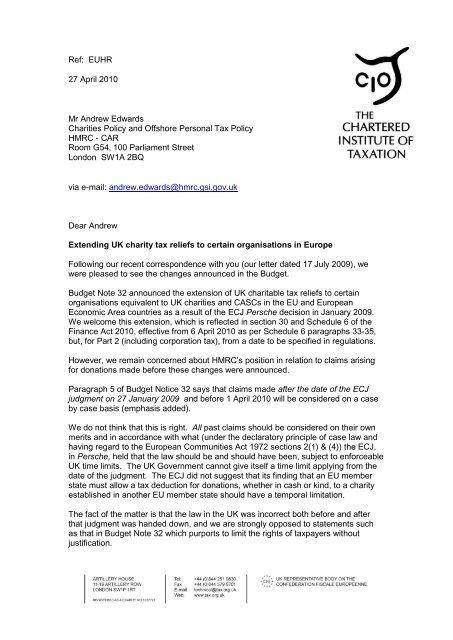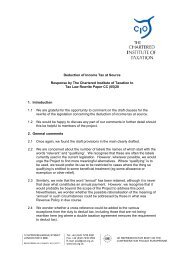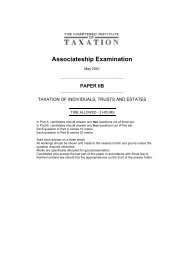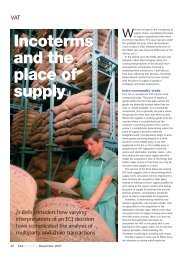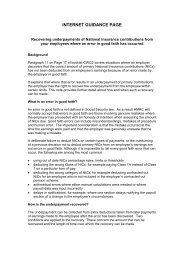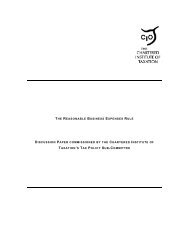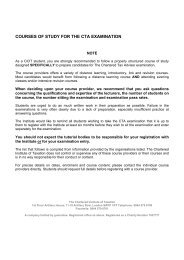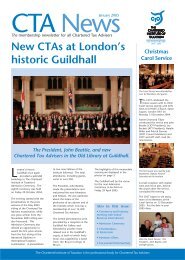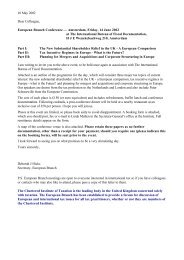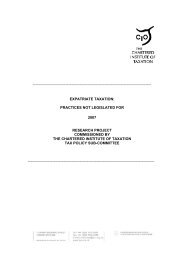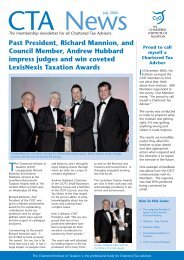UK charity tax reliefs extending to European organisations - CIOT
UK charity tax reliefs extending to European organisations - CIOT
UK charity tax reliefs extending to European organisations - CIOT
You also want an ePaper? Increase the reach of your titles
YUMPU automatically turns print PDFs into web optimized ePapers that Google loves.
Ref: EUHR27 April 2010Mr Andrew EdwardsCharities Policy and Offshore Personal Tax PolicyHMRC - CARRoom G54, 100 Parliament StreetLondon SW1A 2BQvia e-mail: andrew.edwards@hmrc.gsi.gov.ukDear AndrewExtending <strong>UK</strong> <strong>charity</strong> <strong>tax</strong> <strong>reliefs</strong> <strong>to</strong> certain <strong>organisations</strong> in EuropeFollowing our recent correspondence with you (our letter dated 17 July 2009), wewere pleased <strong>to</strong> see the changes announced in the Budget.Budget Note 32 announced the extension of <strong>UK</strong> charitable <strong>tax</strong> <strong>reliefs</strong> <strong>to</strong> certain<strong>organisations</strong> equivalent <strong>to</strong> <strong>UK</strong> charities and CASCs in the EU and <strong>European</strong>Economic Area countries as a result of the ECJ Persche decision in January 2009.We welcome this extension, which is reflected in section 30 and Schedule 6 of theFinance Act 2010, effective from 6 April 2010 as per Schedule 6 paragraphs 33-35,but, for Part 2 (including corporation <strong>tax</strong>), from a date <strong>to</strong> be specified in regulations.However, we remain concerned about HMRC’s position in relation <strong>to</strong> claims arisingfor donations made before these changes were announced.Paragraph 5 of Budget Notice 32 says that claims made after the date of the ECJjudgment on 27 January 2009 and before 1 April 2010 will be considered on a caseby case basis (emphasis added).We do not think that this is right. All past claims should be considered on their ownmerits and in accordance with what (under the declara<strong>to</strong>ry principle of case law andhaving regard <strong>to</strong> the <strong>European</strong> Communities Act 1972 sections 2(1) & (4)) the ECJ,in Persche, held that the law should be and should have been, subject <strong>to</strong> enforceable<strong>UK</strong> time limits. The <strong>UK</strong> Government cannot give itself a time limit applying from thedate of the judgment. The ECJ did not suggest that its finding that an EU memberstate must allow a <strong>tax</strong> deduction for donations, whether in cash or kind, <strong>to</strong> a <strong>charity</strong>established in another EU member state should have a temporal limitation.The fact of the matter is that the law in the <strong>UK</strong> was incorrect both before and afterthat judgment was handed down, and we are strongly opposed <strong>to</strong> statements suchas that in Budget Note 32 which purports <strong>to</strong> limit the rights of <strong>tax</strong>payers withoutjustification.
Extending <strong>UK</strong> <strong>charity</strong> <strong>tax</strong> <strong>reliefs</strong> <strong>to</strong> certain <strong>organisations</strong> in Europe<strong>CIOT</strong> comments 27 April 2010We suggest that HMRC make a further announcement clarifying the position andpublicising the rights of <strong>tax</strong>payers correctly.We look forward <strong>to</strong> hearing from you.Yours sincerelyNigel EastawayChairman, EUHR Sub-Committeecc: Charity Policy Tax Team, HMRC - <strong>charity</strong>policy.<strong>tax</strong>team@hmrc.gsi.gov.ukThe Chartered Institute of TaxationThe Chartered Institute of Taxation (<strong>CIOT</strong>) is a <strong>charity</strong> and the leading professionalbody in the United Kingdom concerned solely with <strong>tax</strong>ation. The <strong>CIOT</strong>’s primarypurpose is <strong>to</strong> promote education and study of the administration and practice of<strong>tax</strong>ation. One of the key aims is <strong>to</strong> achieve a better, more efficient, <strong>tax</strong> system for allaffected by it – <strong>tax</strong>payers, advisers and the authorities.The <strong>CIOT</strong>’s comments and recommendations on <strong>tax</strong> issues are made solely in order<strong>to</strong> achieve its primary purpose: it is politically neutral in its work. The <strong>CIOT</strong> will seek<strong>to</strong> draw on its members’ experience in private practice, Government, commerce andindustry and academia <strong>to</strong> argue and explain how public policy objectives (<strong>to</strong> theextent that these are clearly stated or can be discerned) can most effectively beachieved.The <strong>CIOT</strong>’s 15,000 members have the practising title of ‘Chartered Tax Adviser’.P/tech/subsfinal/EUHR 2 27.4.10


